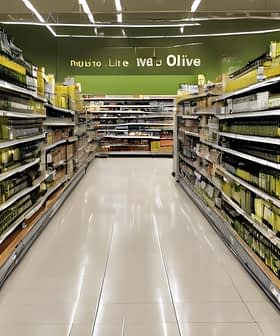Even an Abundant Harvest Would Not Ward Off Olive Oil Shortage in Italy
The general director of Assitol blamed an imbalanced market on poor harvests across the Mediterranean and the strategies of large retailers.
Producers and officials have warned that Italy may run out of olive oil in the coming months.
The country’s relatively low harvest and exceptionally poor harvests in Spain and across much of the Mediterranean have resulted in a severe shortage.
Should Italy report an increase in olive oil production, returning to higher production levels, even then such results will not allow the market to settle, as Spanish yields will still be lower than needed.
“The unified public information system for the Italian agricultural market (SIAN) reported 96,000 tons of olive oil stored in Italy at the end of April,” Andrea Carrassi, general director of the Italian Association of the Edible Oil Industry (Assitol), told Olive Oil Times. “And monthly sales reach approximately 11,000 tons on average.”
In this situation, the math is mercilessly simple. “Given that the new season will start between next October and November, we risk reaching that moment with less than 30,000 tons in stock,” Carrassi said. “If we were a car, our fuel tank light would already be flashing worryingly red.”
See Also:Olive Oil Prices Rising Faster than Inflation in ItalyInternational Olive Council (IOC) figures show that Italy has produced an average of about 275,000 tons of olive oil per annum in the last five years. The average of the previous five years slightly exceeded 345,000 tons.
Progressively lower volumes have characterized the last decade. Since 2009/10, Italian production has not exceeded 500,000 tons, a yield that used to be easily exceeded almost every season since the turn of the century.
“As an industry, we are all well aware of that,” Carrassi said. “While Italian quality is globally acknowledged as exceptional, volumes have been reducing. The whole production chain is at work to reverse this trend.”
Assitol’s general director said producers are used to coping with alternating olive oil yields and stocks from one year to the next.
“We do not produce steel bolts; there is no such thing as a given production volume in agriculture,” Carrassi said. “Agricultural production changes year after year, and olive oil even more than that, as we have the alternate fruit-bearing seasons.”
“Such an alternate trend would be normal,” he added. “What is not normal, though, is the drought which affected most of the more relevant olive oil producing countries in the Mediterranean basin.”
The drought in Spain halved the country’s production to about 660,000 tons. And it also took its toll on Portuguese production, widely reducing the overall availability of olive oil on the national and international markets.
According to Carrassi, considering the high levels of olive oil consumption in Italy and the high volume of its olive oil exports, such shortages are creating a perfect storm on the market.
“We are a country where almost 600,000 tons of olive oil are consumed annually,” Carrassi said. “We export more than 400,000 tons and are now producing a little more than 200,000 tons. That means that about 80 percent of our olive oil needs are covered by imports.”
Carrassi added that the coming harvest will unlikely fix Italy’s olive oil deficit. “Lately, in Italy, we are having even too much rain, as witnessed by the tragic floods in Emilia-Romagna,” Carrassi said. “But in Spain, it has not rained since February, which is destined to impact the new olive oil campaign.”
“The scenario is complicated by the fact that Tunisia is also experiencing drought,” he added. “In the country, they are now rationing water use during the night to save a part of it for farmers.”
Tunisia is a highly relevant producer, with an annual average production of 228,000 tons in the last five years. A large portion of its exports are destined for the European Union.
“To save the situation, we would need a season with at least 1.5 million tons of olive oil produced in Spain. But that is not going to happen,” Carrassi said.
“In Italy, we are starting a beautiful flowering season; growers are reporting very nice data now,” he added. “If temperatures do not abruptly change and stay in the seasonal average, or even a bit lower, we can nurture hopes for a very good season.”
“For olive growing, the campaign will go even better should it rain a bit during summer,” Carrassi continued. “In this case, the most relevant challenges would possibly come up at the end of August, when warm humidity could facilitate the spread of the olive fruit fly; we will have to monitor that.”
Still, according to Carrassi, Italy’s olive oil production will not be enough. “Should Italy report an increase in olive oil production, returning to higher production levels, even then such results will not allow the market to settle, as Spanish yields will still be lower than needed,” Carrassi said.
Compounding lower yields, Carrassi added that production costs have risen in recent years. “After the Covid-19 pandemic, we had the hiccups in the logistics chain, and after that, we have the Russian war in Ukraine and the turmoil in the energy market,” he said.
“Costs have risen on all fronts, with high inflation,” Carrassi added. “Energy, logistics and even glass, with glass producers closing shop because of the energy costs, are increasing our costs as olive oil in Italy is mostly sold in glass bottles.”
“The drought made it all even more challenging, more than doubling the cost of the raw material on the main international markets,” he continued.
In such a complex scenario, Assitol has directed an appeal to the entire olive oil industry to ensure adequate availability for Italian consumers.
“Our main focus is the large retailers’ role,” Carrassi said. “For years, many of them have used olive oil to entice the interest of consumers through significant discounts. They are prone to sell olive oil below cost because once consumers enter the shop, retailers can recoup such losses with the other items being bought. Olive oil has been, for years, the perfect bait.”
However, he warned these marketing ploys damage the image of olive oil as the keystone ingredient of the Mediterranean diet.
“Selling it below cost undermines the image of the product and hits the whole production chain, starting from farmers and millers,” he said. “On top of that, consumers develop the habit of buying discounted olive oils, which means they do not look for the many differences among different olive oils but only go for the cheapest. The whole concept of olive oil diversity or quality is lost in the process.”
“To the large retailers, we are now asking to reposition the product and give it the dignity it deserves,” Carrassi concluded. “As olive oil stocks go down, olive oil discounts and special offers should be set aside.”









